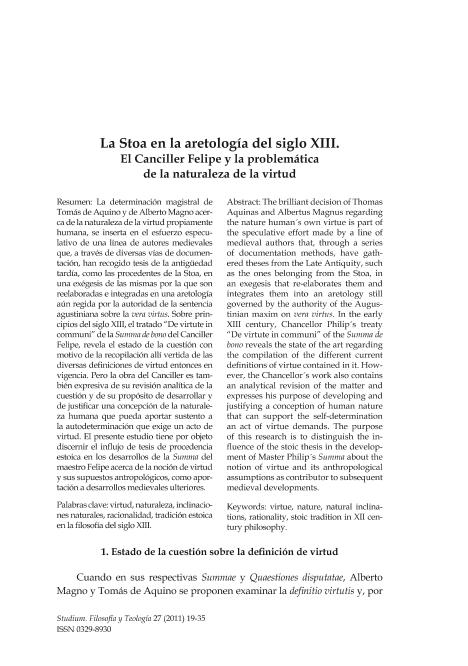Mostrar el registro sencillo del ítem
dc.contributor.author
Corso, Laura Estela

dc.date.available
2023-11-28T14:42:41Z
dc.date.issued
2011-06
dc.identifier.citation
Corso, Laura Estela; La Stoa en la aretología del siglo XIII: El Canciller Felipe y la problemática de la naturaleza de la virtud; Universidad del Norte Santo Tomás de Aquino. Facultad de Humanidades; Centro de Estudios de la Orden de Predicadores; Studium; 27; 6-2011; 19-35
dc.identifier.issn
1518-0913
dc.identifier.uri
http://hdl.handle.net/11336/218681
dc.description.abstract
La determinación magistral de Tomás de Aquino y de Alberto Magno acerca de la naturaleza de la virtud propiamente humana, se inserta en el esfuerzo especulativo de una línea de autores medievales que, a través de diversas vías de documentación, han recogido tesis de la antigüedad tardía, como las procedentes de la Stoa, en una exégesis de las mismas por la que son reelaboradas e integradas en una aretología aún regida por la autoridad de la sentencia agustiniana sobre la vera virtus. Sobre principios del siglo XIII, el tratado “De virtute in communi” de la Summa de bono del Canciller Felipe, revela el estado de la cuestión con motivo de la recopilación allí vertida de las diversas definiciones de virtud entonces en vigencia. Pero la obra del Canciller es también expresiva de su revisión analítica de la cuestión y de su propósito de desarrollar y de justificar una concepción de la naturaleza humana que pueda aportar sustento a la autodeterminación que exige un acto de virtud. El presente estudio tiene por objeto discernir el influjo de tesis de procedencia estoica en los desarrollos de la Summa del maestro Felipe acerca de la noción de virtud y sus supuestos antropológicos, como aportación a desarrollos medievales ulteriores.
dc.description.abstract
The brilliant decision of Thomas Aquinas and Albertus Magnus regarding the nature human´s own virtue is part of the speculative effort made by a line of medieval authors that, through a series of documentation methods, have gathered theses from the Late Antiquity, such as the ones belonging from the Stoa, in an exegesis that re-elaborates them and integrates them into an aretology still governed by the authority of the Augustinian maxim on vera virtus. In the early XIII century, Chancellor Philip´s treaty “De virtute in communi” of the Summa de bono reveals the state of the art regarding the compilation of the different current definitions of virtue contained in it. However, the Chancellor´s work also contains an analytical revision of the matter and expresses his purpose of developing and justifying a conception of human nature that can support the self-determination an act of virtue demands. The purpose of this research is to distinguish the influence of the stoic thesis in the development of Master Philip´s Summa about the notion of virtue and its anthropological assumptions as contributor to subsequent medieval developments.
dc.format
application/pdf
dc.language.iso
spa
dc.publisher
Universidad del Norte Santo Tomás de Aquino. Facultad de Humanidades; Centro de Estudios de la Orden de Predicadores
dc.rights
info:eu-repo/semantics/openAccess
dc.rights.uri
https://creativecommons.org/licenses/by-nc-sa/2.5/ar/
dc.subject
NATURALEZA Y RACIONALIDAD
dc.subject
INCLINACIONES NATURALES
dc.subject
ARETOLOGÍA MEDIEVAL
dc.subject
HELENISMO Y FILOSOFÍA MEDIEVAL
dc.subject.classification
Filosofía, Historia y Filosofía de la Ciencia y la Tecnología

dc.subject.classification
Filosofía, Ética y Religión

dc.subject.classification
HUMANIDADES

dc.title
La Stoa en la aretología del siglo XIII: El Canciller Felipe y la problemática de la naturaleza de la virtud
dc.type
info:eu-repo/semantics/article
dc.type
info:ar-repo/semantics/artículo
dc.type
info:eu-repo/semantics/publishedVersion
dc.date.updated
2023-11-24T11:11:30Z
dc.journal.number
27
dc.journal.pagination
19-35
dc.journal.pais
Argentina

dc.journal.ciudad
San Miguel de Tucumán
dc.description.fil
Fil: Corso, Laura Estela. Universidad de Buenos Aires; Argentina. Consejo Nacional de Investigaciones Científicas y Técnicas; Argentina
dc.journal.title
Studium

dc.relation.alternativeid
info:eu-repo/semantics/altIdentifier/url/https://revistas.unsta.edu.ar/index.php/Studium/article/view/566
Archivos asociados
